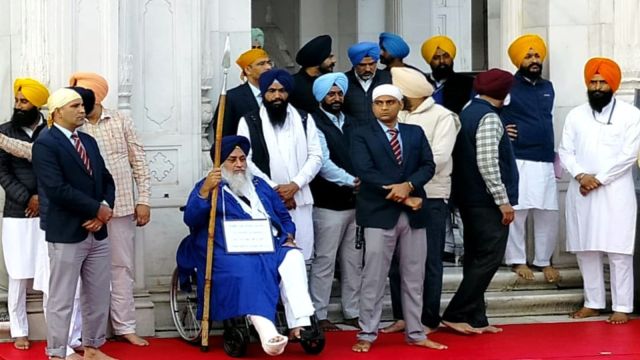Sukhbir Badal, Sukhdev Dhindsa stand guard outside Golden Temple day after Akal Takht orders punishment
Sukhbir Badal and other Akali leaders are being punished by the Akal Takht over the SAD government’s failures in addressing key issues of the Sikh community between 2007 and 2017.
 Sukhbir Singh Badal and former Rajya Sabha MP Sukhdev Singh Dhindsa were made to stand guard. (Express photo)
Sukhbir Singh Badal and former Rajya Sabha MP Sukhdev Singh Dhindsa were made to stand guard. (Express photo)A day after the Akal Takht, the highest temporal body of Sikhs, pronounced religious punishment for Sukhbir Singh Badal and other leaders for “mistakes” committed by the Shiromani Akali Dal (SAD) government in Punjab from 2007 to 2017, the party chief started his religious sentence by standing guard outside the Golden Temple in Amritsar on Tuesday.
Former Rajya Sabha MP Sukhdev Singh Dhindsa was also made to stand guard. Badal and other Akali Dal leaders, including former Cabinet ministers, were ordered to clean toilets, serve in the community kitchen, perform Nitnem (daily Sikh prayers), and recite the Sukhmani Sahib.
Sukhbir Singh Badal, with his leg in a cast, sat solemnly on guard, surrounded by his security team and a few Akali leaders. Some party leaders approached to greet him, but Sukhbir remained largely unresponsive, keeping his gaze fixed on the ground. Occasionally, he murmured quietly, as if reciting something. Holding a spear and donning a cloak similar to the Shiromani Gurdwara Parbandhak Committee (SGPC) task force uniform, he presented an unusual sight.
His duty was symbolic yet significant—standing guard at the entrance of Darbar Sahib, ensuring no one entered without a head covering. While Sikh devotees observed with quiet curiosity, non-Sikh tourists appeared puzzled, trying to understand the scene before them. Among the devotees, hushed discussions centred on divine justice and Sukhbir’s perceived penance for past actions.
“This is the house of God. Sooner or later, one has to pay for their deeds. Divine justice is inescapable,” whispered two Sikh devotees, their eyes fixed on Sukhbir. Yet, no one openly confronted him during his hour-long duty.
Unlike his usual public appearances, when people rushed to click selfies with him, devotees merely snapped photos from a distance. His broken leg and subdued demeanour seemed to command an air of reverence rather than camaraderie.
Sukhbir’s duty as a guard was to last an hour, a task he would repeat the following day at Darbar Sahib. Afterward, he is scheduled to perform similar duties at Takht Damdama Sahib in Talwandi Sabo, Takht Kesgarh Sahib in Anandpur Sahib, and Gurudwara Darbar Sahib in Muktsar.
Meanwhile, across the entrance, Sukhdev Singh Dhindsa carried out his guard duty with minimal fanfare. Looking frail and quiet, Dhindsa performed the task without drawing much attention. Once their respective shifts ended, both leaders attended kirtan inside Darbar Sahib, fulfilling the religious obligations tied to their service.
The two are to serve as gatekeepers for two days, wearing traditional servant attire and holding spears as a mark of humility.
The Jathedar also revoked the title of Fakhr-e-Qaum (Pride of the Nation) awarded to former Punjab Chief Minister Parkash Singh Badal for his contributions to the Sikh community. He was the first political leader to be conferred with this title.
The party leadership was also criticised over its failure to address key issues of the community between 2007 and 2017. These included incidents of sacrilege, and police firing at Kotkapura as well as the appointment of Director General of Police Sumedh Singh Saini, who was accused of rights violations during the militancy period in Punjab.
Besides, all facilities provided to former Jathedar Giani Gurbachan Singh — who had pardoned Dera Sacha Sauda chief Gurmeet Ram Rahim, ostensibly under the influence of the Badals — would be withdrawn.







